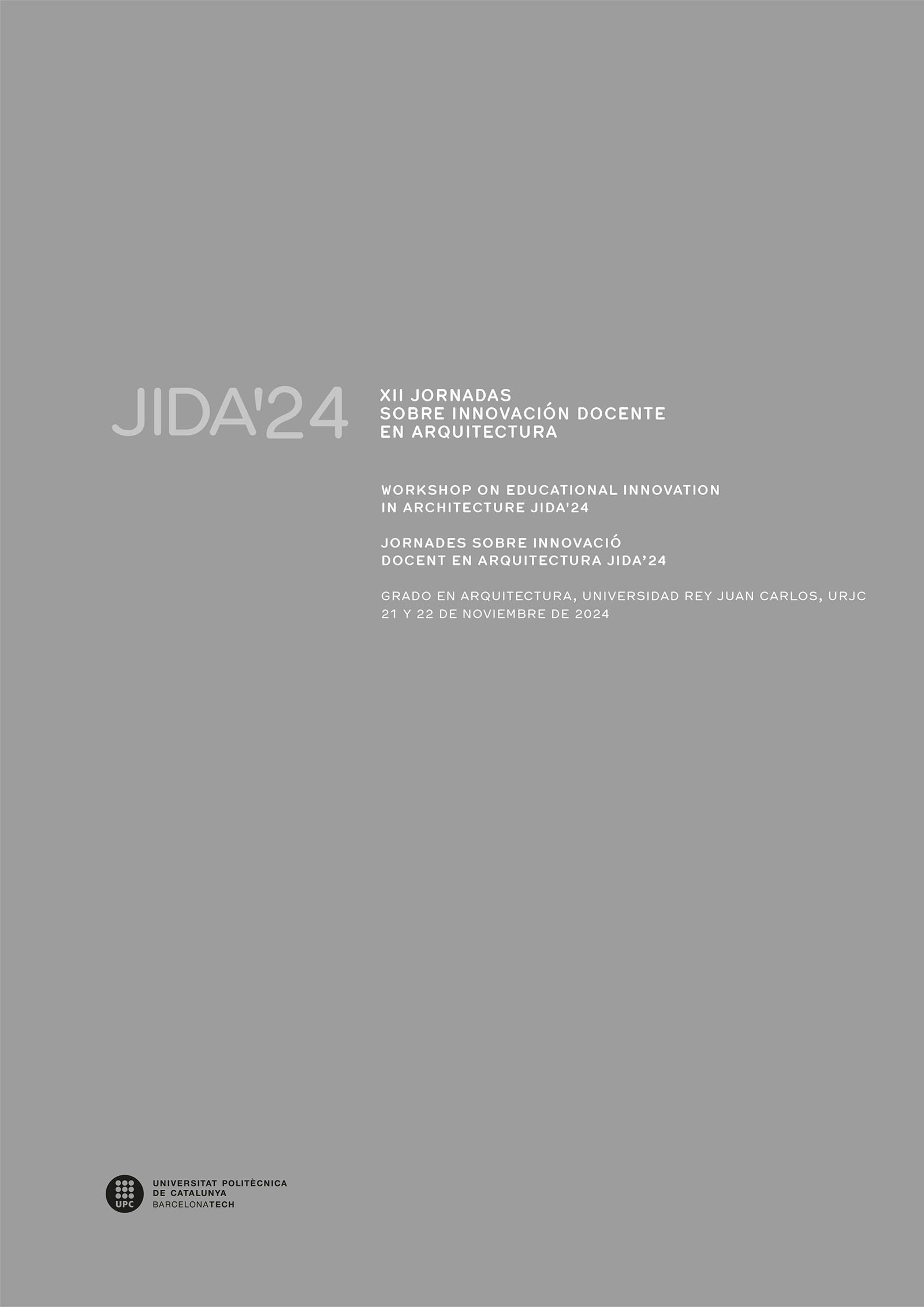BIP-StUDent: an innovative exchange experience for the training of urban planners
DOI:
https://doi.org/10.5821/jida.2024.13313Keywords:
Erasmus , blended intensive programmes, urbanism learning, urbanism, educational exchangeAbstract
This paper aims to share the experience of a Blended Intensive Programme (BIP) on urban planning carried out in a school of architecture in Spain (Institution 1) during the academic year 2023-24. Within the Erasmus+ framework, BIPs are exchange programmes for students and staff of European universities that are characterised by being intensive and blended. The European Commission considers these programmes to be a means of educational and teaching innovation with two main aspects to highlight. On the one hand, they are programmes that promote transdisciplinary and transnational cooperation thanks to their relatively quick and simple management. On the other hand, their hybrid format and short duration facilitate access to international exchange for a greater number and diversity of profiles within the educational community.
With regard to the teaching of architecture and urban planning, the experience of Institution 1 seems to indicate that this format is particularly well suited to these disciplines. Projects and case studies, common working methodologies in architecture curricula, are in line with the BIP approach. They allow for intensive work, i.e. work is done in a limited way, based on a contextualised problem, and the degree of definition of the solutions expected from the students can be established more concretely according to the framework and the profile of the participants. On the other hand, the very nature of architectural disciplines favours and requires multidisciplinary work, especially in the case of urban planning.
Institution 1 is the institution to which most BIPs have taken place in the whole university to which it belongs. The Department that led the experience that is the subject of this paper had already participated in BIPs and is currently involved in three exchanges of this type. The exchange programme that is the focus of this paper involved two other European institutions: one Austrian (Institution 2) and one German (Institution 3). The consortium was based on other types of previous collaborations on the part of the teaching staff, but mainly on the conviction that transnationality and interdisciplinarity are two indispensable skills in the current training in urban planning.
Institutions 1, 2 and 3 represent three different geographical contexts and also three different urban planning traditions and cultures. Furthermore, from the point of view of multidisciplinarity, each institution specialises in a distinct area within the disciplines of planning and design of the built environment. Institution 1 is particularly specialised in urban form, a spatial design approach with a strong emphasis on architecture and the composition of urban fabrics. Institution 2 focuses its training from a landscape perspective and works more intensively on territorial scale and environmental issues. Institution 3, on the other hand, is closer to civil engineering, with a focus on constructive and technical aspects.
The profile of the three institutions shaped the theme and approach of the programme. The consortium proposed an exchange focused on mutual learning through interdisciplinarity and multiculturalism. To this end, a three-year horizon was designed in which each institution would lead a call and be responsible for the general design of the programme and for hosting the rest of the consortium in its city during the face-to-face exchange phase. Institution 1 led the first edition based on a 3.5 ECTS programme combining a week of face-to-face exchange in the city of Valencia and three online seminars.
During the months of October, November and December 2023 the students of the three institutions worked on different issues and through different tasks. Each institution began by studying the main urban planning frameworks of their cities and regions with the aim of familiarising themselves with the urban planning regulations and strategies in their context and also in the rest of the consortium. Subsequently, a district of the city of Valencia was chosen, which would constitute the working environment for the rest of the exchange, both during the face-to-face phase and in the remaining virtual seminars. This work was carried out in groups made up of students from each institution (mixed groups) in which each student contributed their knowledge and skills to a common project. These projects had to propose an urban improvement solution that had to respond to the parameters of sustainability, focusing on some of the most relevant issues for the neighbourhood scale: housing, local facilities, green infrastructure and active mobility.
The results of the first edition of this BIP have been very positive. The students improved their skills thanks to the exchange with students of different profiles and were able to develop a quality project in reduced time thanks to the intensive format. The students' evaluation concludes a high degree of satisfaction and learning, not only with regard to their training as future urban planners, but also on a personal level. The second edition of the programme is currently being planned and will be coordinated by Institution 2 in autumn 2024.
References
Comisión Europea. 2023. Erasmus +. Guía del Programa. Bruselas https://erasmus-plus.ec.europa.eu/sites/default/files/2023-11/2024-Erasmus%2BProgramme-Guide_ES.pdf
Comisión Europea. 2021. Higher Education Mobility Handbook for Higher Education Instiutions. Bruselas: DG EAC- Unit B.1. https://wikis.ec.europa.eu/download/attachments/33530413/Higher%20Education%20Mobility%20Handbook%20for%20Beneficiaries.pdf?api=v2
Galán, Juanjo y Luis Bosch Roig, 2024. VLC Summer School on Synergic Urban Infrastructures. Valencia: Editorial UPV. https://doi.org/10.4995/2024.677901
OPII-UPV. «¿Qué son los Erasmus BIPS (Blended Intensive Programmes)?». Accedido 1 de septiembre de 2024. https://www.upv.es/entidades/OPII/infoweb/pi/info/1200405normalc.html
Tribunal de Cuentas Europeo. 2018. Informe Especial. La movilidad en Eramus+: Millones de participantes y valor añadido europeo multidimensional, pero es necesario mejorar la medición del rendimiento. Luxemburgo. https://www.eca.europa.eu/Lists/ECADocuments/SR18_22/SR_ERASMUS_ES.pdf



















